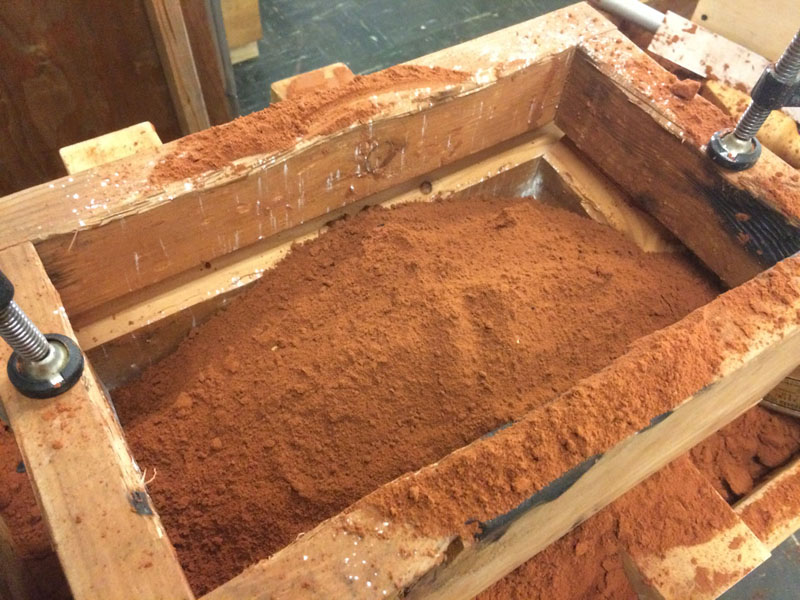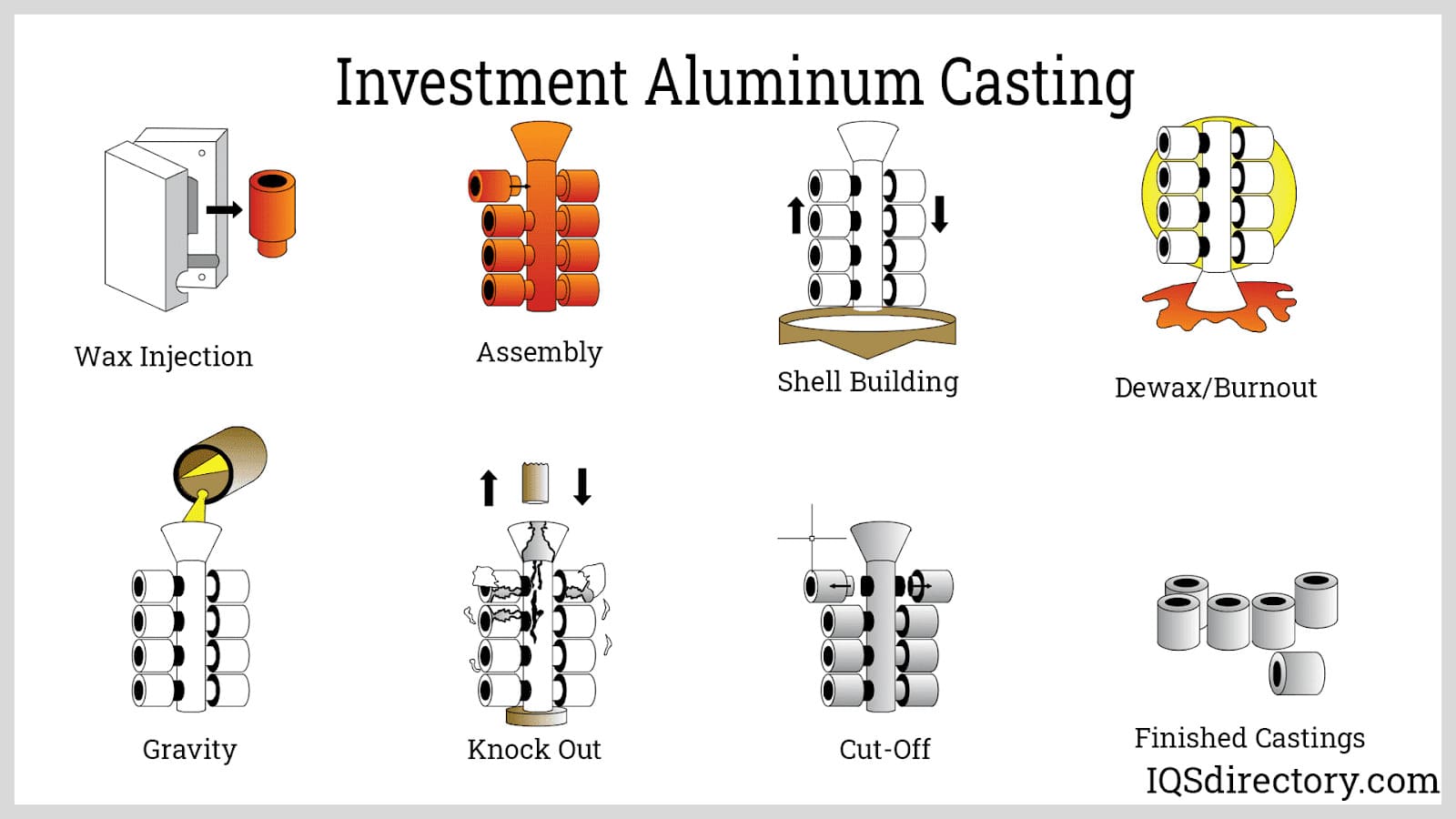Explore Aluminum Foundry and its value in high-quality aluminum casting results
Wiki Article
The Function of Aluminum Foundry in Enhancing Production Effectiveness Across Diverse Sectors
Aluminum factories serve a necessary feature in modern manufacturing by boosting production performance across numerous industries. They harness advanced strategies and lasting methods to decrease and enhance workflows waste. The effect of Aluminum encompasses markets such as auto, aerospace, and building and construction, where its distinct residential or commercial properties improve efficiency. Nevertheless, the challenges encountered by these foundries can form their future. Comprehending these dynamics discloses an intricate landscape of development and adaptationThe Relevance of Aluminum in Modern Production

The versatility of Aluminum makes it possible for a large range of construction strategies, consisting of extrusion, machining, and spreading. Moreover, its recyclability better emphasizes its value, as recycled Aluminum calls for significantly much less energy to create than brand-new Aluminum, lining up with modern ecological goals. As sectors remain to advance, Aluminum's one-of-a-kind attributes and versatility guarantee it stays an important material for driving development and effectiveness in manufacturing procedures. Its payments extend beyond performance, supporting financial development and sustainability efforts around the world.
Secret Procedures in Aluminum Foundries
In Aluminum factories, numerous crucial procedures are vital for achieving high production performance. Thawing and alloying strategies, along with molding and casting techniques, play an important role fit the end product. Furthermore, executing rigorous quality assurance gauges assurances that the outcome meets industry requirements.Melting and Alloying Techniques
Although melting and alloying are essential procedures in Aluminum factories, their effectiveness substantially impacts total production quality and price. The melting procedure usually includes the usage of electrical heaters or gas-fired systems, which permit specific temperature control. This assures that Aluminum reaches its ideal melting point, minimizing power intake. Alloying, on the various other hand, requires the addition of particular elements to achieve desired material homes, such as stamina and corrosion resistance. Strategies such as pre-alloying and in-situ alloying are commonly employed to boost uniformity and decrease waste. Careful surveillance throughout both melting and alloying phases is vital, as it straight affects the product attributes and assurances compliance with sector requirements, ultimately bring about improved production performance across various industries.Molding and Casting Methods
A selection of molding and casting approaches are important to the effectiveness and top quality of Aluminum factories. Amongst these techniques, sand spreading, die spreading, and permanent mold and mildew casting stand apart due to their special advantages. Sand spreading supplies versatility for complicated forms and is economical for low production quantities. Pass away spreading, understood for its accuracy and repeatability, is suitable for high-volume production, supplying superb surface area finishes and dimensional precision. Irreversible mold spreading combines the benefits of both sand and pass away spreading, allowing for far better mechanical residential properties and decreased product waste. Each approach serves particular applications across varied sectors, allowing Aluminum shops to optimize production procedures, lower lead times, and meet varying consumer needs efficiently.Quality Assurance Actions
Assuring premium Aluminum items requires strenuous quality assurance measures at every stage of the Foundry process. These measures begin with the selection of basic materials, where comprehensive testing for impurities and composition is important. When products are approved, assessments throughout the molding and spreading stages keep track of measurements and surface top quality to stop flaws. Advanced methods, such as non-destructive screening, are employed to discover interior imperfections that might endanger item stability. Additionally, procedure control systems continuously keep track of temperature level and alloy structure to preserve uniformity. Last assessments, consisting of mechanical residential property testing, confirm that the items satisfy sector standards. By executing these rigid quality assurance protocols, Aluminum shops boost production effectiveness and guarantee the reliability of their items throughout varied markets.Developments Driving Manufacturing Efficiency
Developments in Aluminum shops are transforming production effectiveness via advanced casting methods and the assimilation of automation and robotics. These developments not just streamline operations but likewise improve precision and reduce waste. Additionally, lasting product developments are adding to even more eco-friendly methods within the market.Advanced Casting Techniques
Various advanced casting methods are changing the Aluminum Foundry sector, significantly improving production effectiveness. Approaches such as die spreading, sand casting, and investment casting have actually developed, enabling enhanced precision and minimized waste. Developments like computer-aided style (CAD) and simulation software program enable shops to Aluminum Foundry maximize mold style and forecast potential problems prior to production, minimizing expensive mistakes - Aluminum Foundry. In addition, the use of alloy advancement techniques improves product homes, bring about items that fulfill stringent performance requirements. Techniques such as rapid prototyping and 3D printing are also acquiring traction, assisting in faster turn-around times for complicated geometries. These innovations not only streamline production processes but additionally add to sustainability efforts by decreasing energy consumption and improving material usage in the Aluminum casting industry
Automation and Robotics Integration
The integration of automation and robotics in the Aluminum Foundry field is changing production efficiency. By using advanced robotic systems for tasks such as molding, putting, and ending up, factories are considerably reducing labor prices and lessening human error. Automated procedures simplify manufacturing lines, permitting faster turn-around times and constant quality in produced elements. Additionally, the execution of real-time monitoring systems makes it possible for operators to track efficiency metrics and optimize operations proactively. Robotics likewise boosts security by taking control of dangerous jobs, thus reducing work environment accidents. As the innovation proceeds to develop, the Aluminum Foundry sector is poised to utilize these developments additionally, ensuring competitiveness and responsiveness in a significantly demanding market.
Lasting Product Innovations
As the Aluminum Foundry industry seeks to boost production efficiency, lasting product developments are becoming an important variable. These innovations include the growth of environmentally friendly alloys and the usage of recycled Aluminum, substantially decreasing the environmental effect of manufacturing processes. Advanced methods, such as additive manufacturing and environment-friendly spreading approaches, enable factories to lessen waste while boosting product residential properties. In addition, the integration of bio-based binders and coverings brings about much healthier workplace and lowers emissions. The adoption of life cycle evaluation tools additional aids foundries in identifying sustainability chances, lining up with worldwide patterns towards accountable manufacturing. These improvements not just improve manufacturing effectiveness however likewise position the Aluminum Foundry sector as a leader in lasting industrial methods.Ecological Sustainability in Aluminum Casting
While Aluminum casting has long been a staple in production, its ecological impact has motivated a change towards even more lasting methods. Numerous foundries are currently embracing eco-friendly strategies to lessen waste and energy consumption. By utilizing recycled Aluminum, foundries substantially lower the demand for virgin products, consequently reducing and saving natural sources greenhouse gas emissions.Innovations such as innovative melting innovations and enhanced furnace layouts additionally boost energy performance. Carrying out closed-loop systems permits for the recycling of by-products and scraps, minimizing garbage dump payments. In addition, the usage of water-based finishings and biodegradable materials in the spreading procedure reduces hazardous exhausts and environmental toxic substances.
As sectors increasingly prioritize sustainability, the Aluminum spreading industry is straightening with these values, demonstrating that financial development and environmental obligation can coexist. This commitment to sustainable techniques not only benefits the atmosphere yet also positions Aluminum factories as leaders in accountable production.
Applications of Aluminum Parts in Various Industries
Aluminum components are progressively used throughout numerous sectors due to their special residential properties, that include light-weight toughness, corrosion resistance, and exceptional thermal conductivity. In the vehicle field, Aluminum is important for producing lighter cars, adding to enhanced fuel effectiveness and minimized exhausts. The aerospace market leverages Aluminum alloys for aircraft parts, profiting from their high strength-to-weight ratio, which boosts efficiency and security.In building and construction, Aluminum is preferred for home windows, doors, and roof covering as a result of its durability and aesthetic allure. The electrical field utilizes Aluminum in power lines and components, making the most of its conductivity and resistance to corrosion. In addition, the durable goods market utilizes Aluminum in packaging and household items, advertising sustainability through recyclability (Aluminum Foundry). In general, Aluminum components play an important function beforehand technological technologies and functional effectiveness across diverse fields, highlighting their value in contemporary manufacturing and layout
Difficulties Encountered by Aluminum Foundries
Countless obstacles confront Aluminum foundries, affecting their effectiveness and performance. One considerable issue is the volatility of basic material rates, which can change unexpectedly, affecting functional expenses and profit margins. In addition, factories typically grapple with rigid ecological laws, needing pricey investments in lasting methods and waste management systems. Labor lacks existing another difficulty, as the proficient workforce required for specialized processes comes to be increasingly limited, leading to prospective delays and top quality control problems.In addition, technological combination postures challenges; shops should continually adapt to improvements in automation and electronic tools to stay affordable. Inadequacies in manufacturing procedures, such as inadequate melting and casting methods, can likewise impede result. Finally, the need for tailored solutions across numerous fields forces shops to balance flexibility with efficiency, complicating production routines. Together, these challenges create an intricate landscape that Aluminum foundries need to navigate to improve their general efficiency.
Future Patterns in Aluminum Foundry Innovation
As the Aluminum Foundry market progresses, emerging innovations are readied to transform production processes and boost performance. Technologies in automation, such as robotics and fabricated intelligence, are expected to streamline procedures, minimize labor expenses, and improve accuracy. Furthermore, advancements in 3D printing modern technology will certainly enable the rapid prototyping of complicated Aluminum elements, reducing lead times and product waste.In addition, the combination of IoT (Internet of Points) will enable real-time surveillance of manufacturing processes, enabling predictive maintenance and reducing downtime. Sustainability will likewise play an essential role, with a raising focus on recycling and power efficiency in Foundry procedures.

Regularly Asked Questions
What Are the Costs Associated With Aluminum Foundry Production?
The expenses related to Aluminum Foundry manufacturing include basic material expenses, labor expenses, energy usage, maintenance of equipment, and expenses. These variables collectively affect the overall financial feasibility and efficiency of the Foundry operations.Exactly How Do Foundries Make Certain Quality Assurance in Aluminum Casting?
Shops guarantee quality control in Aluminum spreading with strenuous screening protocols, consisting of product analysis, dimensional examinations, and procedure surveillance. Carrying out standard procedures and making use of sophisticated technologies aids keep consistency and meet industry specs throughout production.What Safety And Security Actions Are Carried Out in Aluminum Foundries?
Security procedures in Aluminum factories include personal protective devices, appropriate ventilation systems, routine safety training, emergency methods, and tools maintenance. These practices intend to minimize threats, ensuring the wellness of employees and maintaining operational efficiency.For how long Does the Aluminum Casting Refine Usually Take?
The Aluminum casting procedure usually takes numerous hours to numerous days, depending upon variables like the complexity of the layout, the size of the actors, and the particular techniques used by the Foundry.What Skills Are Needed to Function in an Aluminum Foundry?
To operate in an Aluminum Foundry, individuals require skills such as metallurgy expertise, machining efficiency, focus to information, problem-solving capacities, and team effort. Safety awareness and technological proficiency in casting procedures are likewise important for reliable operation.Its recyclability better underscores its importance, as recycled Aluminum needs considerably much less power to create than brand-new Aluminum, aligning with contemporary ecological goals. A range of molding and spreading techniques are essential to the effectiveness and top quality of Aluminum shops. Developments in Aluminum foundries are changing production effectiveness via sophisticated spreading techniques and the integration of automation and robotics. Many advanced casting methods are changing the Aluminum Foundry industry, significantly boosting manufacturing efficiency. Factories assure quality control in Aluminum spreading through rigorous testing methods, consisting of product analysis, dimensional assessments, and procedure monitoring.
Report this wiki page